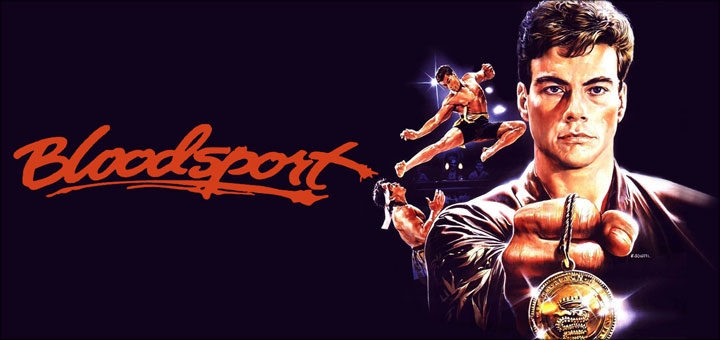Bloodsport (1988)

“Bloodsport,” released in 1988, is a landmark film in the martial arts genre, showcasing the incredible talent of Jean-Claude Van Damme and introducing audiences to the high-octane world of underground fighting. Directed by Newt Arnold and inspired by the supposed true story of Frank Dux, the film combines thrilling action sequences with themes of honor, perseverance, and the quest for personal glory. Over the years, “Bloodsport” has garnered a dedicated following and remains a significant cultural touchstone for martial arts enthusiasts.
The film centers on Frank Dux (played by Jean-Claude Van Damme), a skilled martial artist who seeks to compete in the Kumite, a secret and highly dangerous underground fighting tournament held in Hong Kong. This event draws the best fighters from around the world, each vying for the title of champion. The stakes are high, not only for victory but also for survival, as the fights are brutal and often deadly. Frank’s journey is not just about winning the tournament; it is also about honoring his sensei and proving himself in a world dominated by formidable opponents.
From the outset, “Bloodsport” sets the stage for an intense and action-packed narrative. Frank’s training under the guidance of his mentor, Tanaka (Roy Chiao), highlights the discipline and dedication required to master martial arts. The film artfully juxtaposes Frank’s rigorous training with his personal motivations, revealing a man driven by respect for tradition and a desire to honor his fallen friend. This deeper emotional layer adds depth to the character, making his journey more relatable and compelling.
Jean-Claude Van Damme’s performance as Frank Dux is charismatic and physically impressive. Known for his acrobatic fighting style and athleticism, Van Damme brings a unique energy to the role, captivating audiences with his impressive martial arts skills. The fight choreography showcases a variety of martial arts techniques, including karate, kung fu, and kickboxing, allowing Van Damme to display his range as a fighter. His signature splits and high-flying kicks have become iconic, cementing his status as a martial arts star.
The supporting cast of “Bloodsport” also plays a crucial role in enhancing the film’s narrative. Leah Ayres portrays Janice, a journalist who becomes involved in Frank’s journey and serves as a source of motivation and support. Forest Whitaker delivers a memorable performance as the lovable and comical character, Rawlins, who provides comic relief and camaraderie amidst the intense atmosphere of the tournament. Donald Gibb’s portrayal of Jackson, a fellow fighter, adds to the film’s dynamic, showcasing the camaraderie and rivalries that develop among the participants.

The Kumite tournament itself is the film’s centerpiece, featuring a series of electrifying and brutal fight sequences. Each match showcases the skills of different fighters, each with their unique styles and backgrounds. The diversity of the fighters adds richness to the narrative, as audiences are introduced to a wide array of combatants, including the intimidating Bolo Yeung as the ruthless Chong Li. The fight scenes are well-choreographed and expertly shot, creating a palpable sense of tension and excitement. The filmmakers successfully capture the adrenaline-fueled atmosphere of the tournament, immersing viewers in the high-stakes world of underground fighting.
One of the film’s most significant themes is the idea of honor in martial arts. Throughout “Bloodsport,” characters grapple with the concepts of respect, loyalty, and integrity. Frank’s journey is not just about winning; it is also about upholding the values of martial arts and demonstrating respect for his opponents. This theme resonates deeply within the martial arts community, emphasizing that the true essence of fighting lies not in violence but in honor and discipline.

“Bloodsport” also showcases the cultural diversity within martial arts, presenting fighters from various backgrounds and fighting styles. This celebration of different traditions enriches the film, highlighting the universal appeal of martial arts as a means of self-expression and personal growth. The film serves as a reminder that despite their differences, fighters share a common bond in their pursuit of excellence and their dedication to their craft.
The film’s pacing keeps viewers engaged from start to finish. The combination of training montages, character development, and thrilling fight sequences creates a well-rounded narrative that maintains momentum. As Frank progresses through the tournament, each victory builds on the last, culminating in an intense final showdown with Chong Li. This climactic battle is not only a test of physical strength but also a demonstration of Frank’s growth as a fighter and his commitment to honor.

In conclusion, “Bloodsport” is a seminal film that has left an indelible mark on the martial arts genre. With its compelling storyline, memorable characters, and electrifying fight scenes, it captures the essence of what makes martial arts films so appealing. Jean-Claude Van Damme’s portrayal of Frank Dux is both inspiring and entertaining, solidifying his status as a martial arts icon. The film’s themes of honor, perseverance, and the celebration of cultural diversity resonate with audiences, making “Bloodsport” not just a film about fighting, but a testament to the spirit of martial arts. Its legacy endures, continuing to inspire new generations of martial artists and action movie fans alike.









